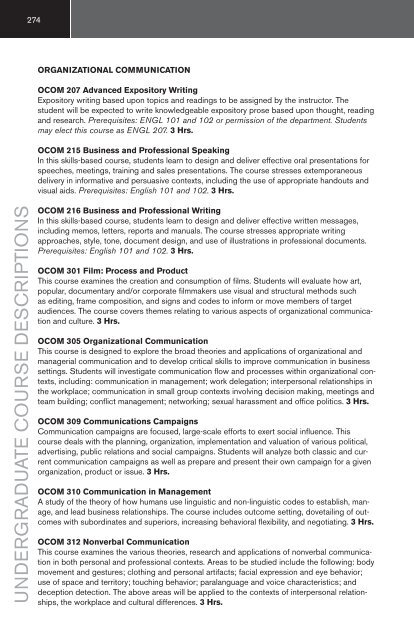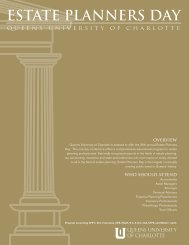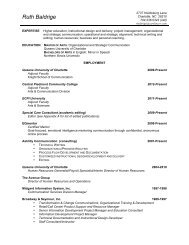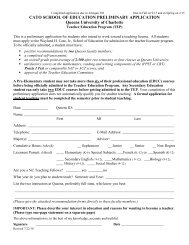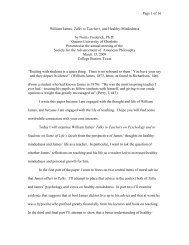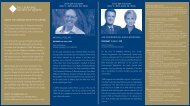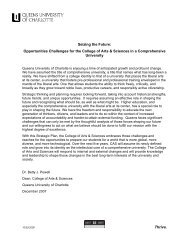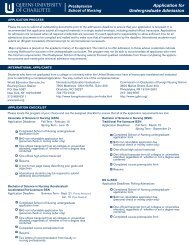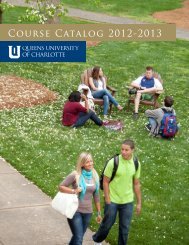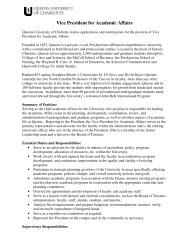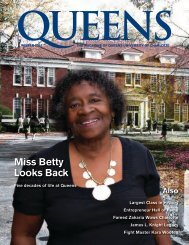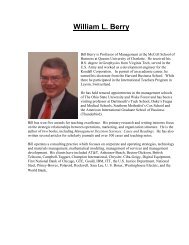2008-2009 Academic Catalog - Queens University of Charlotte
2008-2009 Academic Catalog - Queens University of Charlotte
2008-2009 Academic Catalog - Queens University of Charlotte
You also want an ePaper? Increase the reach of your titles
YUMPU automatically turns print PDFs into web optimized ePapers that Google loves.
274<br />
ORGANIZATIONAL COMMUNICATION<br />
OCOM 207 Advanced Expository Writing<br />
Expository writing based upon topics and readings to be assigned by the instructor. The<br />
student will be expected to write knowledgeable expository prose based upon thought, reading<br />
and research. Prerequisites: ENGL 101 and 102 or permission <strong>of</strong> the department. Students<br />
may elect this course as ENGL 207. 3 Hrs.<br />
OCOM 215 Business and Pr<strong>of</strong>essional Speaking<br />
In this skills-based course, students learn to design and deliver effective oral presentations for<br />
speeches, meetings, training and sales presentations. The course stresses extemporaneous<br />
delivery in informative and persuasive contexts, including the use <strong>of</strong> appropriate handouts and<br />
visual aids. Prerequisites: English 101 and 102. 3 Hrs.<br />
UNDERGRADUATE COURSE DESCRIPTIONS<br />
OCOM 216 Business and Pr<strong>of</strong>essional Writing<br />
In this skills-based course, students learn to design and deliver effective written messages,<br />
including memos, letters, reports and manuals. The course stresses appropriate writing<br />
approaches, style, tone, document design, and use <strong>of</strong> illustrations in pr<strong>of</strong>essional documents.<br />
Prerequisites: English 101 and 102. 3 Hrs.<br />
OCOM 301 Film: Process and Product<br />
This course examines the creation and consumption <strong>of</strong> films. Students will evaluate how art,<br />
popular, documentary and/or corporate filmmakers use visual and structural methods such<br />
as editing, frame composition, and signs and codes to inform or move members <strong>of</strong> target<br />
audiences. The course covers themes relating to various aspects <strong>of</strong> organizational communication<br />
and culture. 3 Hrs.<br />
OCOM 305 Organizational Communication<br />
This course is designed to explore the broad theories and applications <strong>of</strong> organizational and<br />
managerial communication and to develop critical skills to improve communication in business<br />
settings. Students will investigate communication flow and processes within organizational contexts,<br />
including: communication in management; work delegation; interpersonal relationships in<br />
the workplace; communication in small group contexts involving decision making, meetings and<br />
team building; conflict management; networking; sexual harassment and <strong>of</strong>fice politics. 3 Hrs.<br />
OCOM 309 Communications Campaigns<br />
Communication campaigns are focused, large-scale efforts to exert social influence. This<br />
course deals with the planning, organization, implementation and valuation <strong>of</strong> various political,<br />
advertising, public relations and social campaigns. Students will analyze both classic and current<br />
communication campaigns as well as prepare and present their own campaign for a given<br />
organization, product or issue. 3 Hrs.<br />
OCOM 310 Communication in Management<br />
A study <strong>of</strong> the theory <strong>of</strong> how humans use linguistic and non-linguistic codes to establish, manage,<br />
and lead business relationships. The course includes outcome setting, dovetailing <strong>of</strong> outcomes<br />
with subordinates and superiors, increasing behavioral flexibility, and negotiating. 3 Hrs.<br />
OCOM 312 Nonverbal Communication<br />
This course examines the various theories, research and applications <strong>of</strong> nonverbal communication<br />
in both personal and pr<strong>of</strong>essional contexts. Areas to be studied include the following: body<br />
movement and gestures; clothing and personal artifacts; facial expression and eye behavior;<br />
use <strong>of</strong> space and territory; touching behavior; paralanguage and voice characteristics; and<br />
deception detection. The above areas will be applied to the contexts <strong>of</strong> interpersonal relationships,<br />
the workplace and cultural differences. 3 Hrs.


